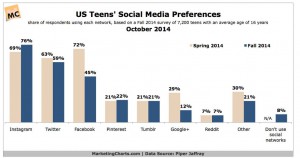Why Facebook Has Difficulties Keeping Teens
— September 5, 2016Why Facebook Struggles to Retain Teenage Users
Introduction
Facebook is one of the most successful social media platforms in history. With staggering user statistics, including 2.1 billion daily active users in the fourth quarter of 2023, its growth seemed unstoppable. Despite its dominance, Facebook faces a unique challenge—maintaining relevance among teenagers. This issue, highlighted in a Piper Jaffray report, demonstrates a significant decline in teenage engagement. While Instagram, owned by Facebook, saw a surge in popularity, Facebook’s struggles with this demographic warrant a closer examination.
This article dives into the reasons behind Facebook’s challenges with teens and explores insights that businesses, particularly in web and mobile development sectors, can learn from this dynamic.
Facebook’s Loss of Appeal to Teens
The Influence of Adult Presence

A common perception is that teenagers abandon Facebook because their parents and grandparents have joined the platform. While the influx of older generations into Facebook has contributed to its loss of “cool” factor among younger users, this is not the sole explanation. Teens crave platforms that reflect their individuality and are free from adult oversight. Facebook’s appeal diminishes when it becomes a space dominated by family members, teachers, and employers.
The Complexity of Teen Social Lives
Teenagers navigate a multifaceted social world with diverse friend groups and shifting alliances. Facebook’s broadcast-oriented model undermines their need to maintain boundaries between these social circles. By design, Facebook promotes wide sharing across a broad audience, which creates what social media researcher Danah Boyd terms “context collapse.”
On Facebook, a post intended for school friends might inadvertently reach family members or acquaintances, leading to discomfort. While Facebook offers tools to create friend lists and restrict visibility, these features are cumbersome and counterintuitive for teens seeking instant communication. This mismatch between teen expectations and Facebook’s structure fuels their shift toward other platforms.
Teen Preferences for Communication
The Role of Immediacy
Teenagers live in the moment and expect their social tools to reflect this mindset. Texting, for instance, embodies the immediacy teens crave, with some sending thousands of texts per month. Although Facebook introduced Messenger, the platform’s integration with its broader social network detracts from its appeal to teens seeking simple, focused communication channels.
This need for immediacy partly explains Facebook’s acquisition of WhatsApp for an astounding sum. WhatsApp caters to real-time messaging demands without the baggage of a sprawling, permanent profile. However, the core Facebook experience remains too slow and formal for teenagers accustomed to instant updates and responses.
A Desire for Ephemeral Interaction
Teenagers frequently reinvent themselves, experimenting with different identities and interests. Facebook’s emphasis on preserving personal history conflicts with this need for reinvention. The platform’s permanent timeline archives every post, photo, and interaction, creating a digital footprint many teens find restrictive.
Snapchat, on the other hand, thrives on ephemerality. Its disappearing messages provide a sense of freedom, allowing teens to express themselves without fear of long-term consequences. This feature aligns perfectly with their desire for flexibility and reinvention, making Snapchat a preferred choice.
Language and Exclusivity
Teenagers often define themselves through unique expressions and behaviors that set them apart from adults. Social media platforms are no exception. Teens gravitate toward spaces where they can develop and use their own “language” free from adult interference.
As Facebook becomes increasingly “polluted” with parents, employers, and older relatives, teens feel compelled to find alternative platforms. This pursuit of exclusivity drives them to explore newer social media apps that better align with their desire for autonomy.
Why There Is No “Solution”
It is crucial to acknowledge that Facebook’s struggle to retain teens does not represent a solvable problem. Teen migration between platforms reflects their natural desire to explore new spaces, not a failure on Facebook’s part. Forcing teenagers to remain on a platform often has the opposite effect, driving them away even faster.
Instead of trying to prevent this migration, platforms should focus on continuous innovation. For web and mobile development businesses, this offers a valuable lesson: understanding users deeply and evolving alongside them is essential.
By creating environments that anticipate the needs of specific demographics, businesses can retain engagement without relying on outdated methods of user retention. The goal is not to trap users but to provide them with evolving solutions that meet their changing preferences.
Lessons for Web and Mobile Development
Designing for User Adaptability
One of Facebook’s challenges lies in its rigidity. Businesses can avoid this pitfall by designing applications that are adaptable and flexible. For instance, offering customizable interfaces or privacy settings that cater to diverse user groups can enhance long-term relevance.
Catering to Ephemeral Trends
Platforms like Snapchat succeeded by understanding a core teen desire: temporary interactions. Web and mobile developers should consider integrating features that align with transient behaviors, such as disappearing messages or time-sensitive content. This strategy can resonate not only with teens but also with broader audiences seeking less permanent digital footprints.
Maintaining a Fresh Appeal
Teen migration teaches a broader lesson about the importance of staying innovative. For companies like S3Corp, which specialize in outsourcing web and mobile development, maintaining a cutting-edge approach to design and functionality is critical. By keeping platforms fresh and appealing, developers can attract and retain users across age groups.
Conclusion
Facebook’s challenges with retaining teenage users highlight the dynamic nature of social media engagement. Teenagers are drawn to platforms that prioritize immediacy, ephemerality, and exclusivity—qualities that Facebook struggles to offer. While this migration is natural, it underscores the importance of innovation and user-centric design for businesses aiming to thrive in competitive markets.
For companies in Vietnam and beyond, such as S3Corp, these insights emphasize the value of understanding user behavior deeply. By embracing change and continuously offering relevant solutions, businesses can navigate shifting user preferences successfully.






